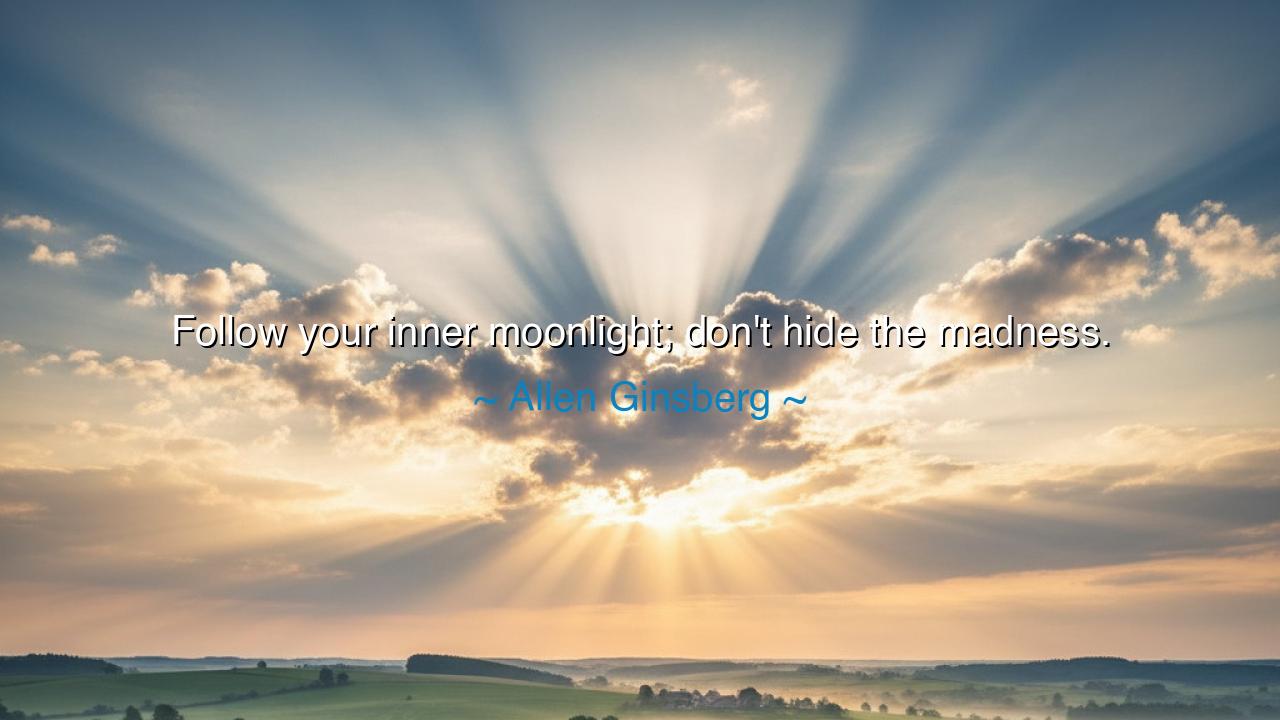
Follow your inner moonlight; don't hide the madness.






Hear, O seeker of freedom, the words of Allen Ginsberg, poet of fire and prophet of the Beat Generation, who declared: “Follow your inner moonlight; don’t hide the madness.” This was no idle phrase, but the anthem of a man who lived in defiance of conformity, calling others to shed the shackles of false respectability. For within every soul burns a strange and radiant flame—part light, part madness—and only by following it can one live as their truest self.
To follow your inner moonlight is to heed the quiet, silvery glow that shines within the depths of the heart. The moonlight does not blaze like the sun, nor blind with its brilliance, but casts a softer, stranger light, illuminating paths unseen by ordinary eyes. It is the light of imagination, of dreams, of the soul’s secret desires. To follow it is to walk by intuition rather than law, by vision rather than convention. Ginsberg, poet of outsiders, urged men and women not to betray this inner moon but to walk by it, however winding the road.
And he commands: “Don’t hide the madness.” For madness is the name the world gives to those who refuse its narrow cages. The prophets, the artists, the visionaries—all were called mad in their time. Socrates was accused of corrupting youth with strange wisdom. Galileo was condemned for daring to look at the heavens with clearer sight. Vincent van Gogh painted what others could not see, and they called him insane. Yet their madness was only a deeper sanity, a vision too vast for the timid. To hide such madness is to smother the very gift that might heal or awaken the world.
Consider the story of Emily Dickinson, who wrote in solitude, rarely showing her face to the world. Her poems were deemed eccentric, her style too unorthodox. Many dismissed her as reclusive and odd. Yet within her hidden life burned a fierce inner moonlight, and though she never sought fame, her “madness” of form and thought revealed truths about love, death, and eternity that no tidy convention could express. Now, long after her death, her words shine as constellations in the sky of literature.
The wisdom of Ginsberg’s cry is this: the world honors conformity but depends upon rebellion. Progress comes not from those who fit neatly into society’s mold, but from those who dare to be strange. If every voice echoed the same tone, there would be no harmony, only monotony. It is the wild notes, the unexpected chords, that give music its power. Likewise, it is the so-called madness of originality that gives humanity its leaps forward in art, science, and spirit.
O listener, do not be ashamed of your inner moonlight. Do not fear if others call you strange, foolish, or mad. Instead, walk in your own light, and let your madness be your gift. Write the words that only you can write, speak the truth that only you can speak, live the life that only you can live. For the world has no need of shadows that mimic others—it thirsts for flames that burn in their own colors.
Therefore take this teaching into your daily life: listen for the whispers of your soul, follow the glow that others may not see, and let your so-called madness shine without apology. In doing so, you join the lineage of prophets, artists, and dreamers whose lives seemed strange to their own age but became guiding stars for ages to come.
Thus, Ginsberg’s words endure: “Follow your inner moonlight; don’t hide the madness.” For your strangeness may be your strength, your madness may be your wisdom, and your moonlight may be the very beacon another soul needs to find their way through the dark.






AAdministratorAdministrator
Welcome, honored guests. Please leave a comment, we will respond soon